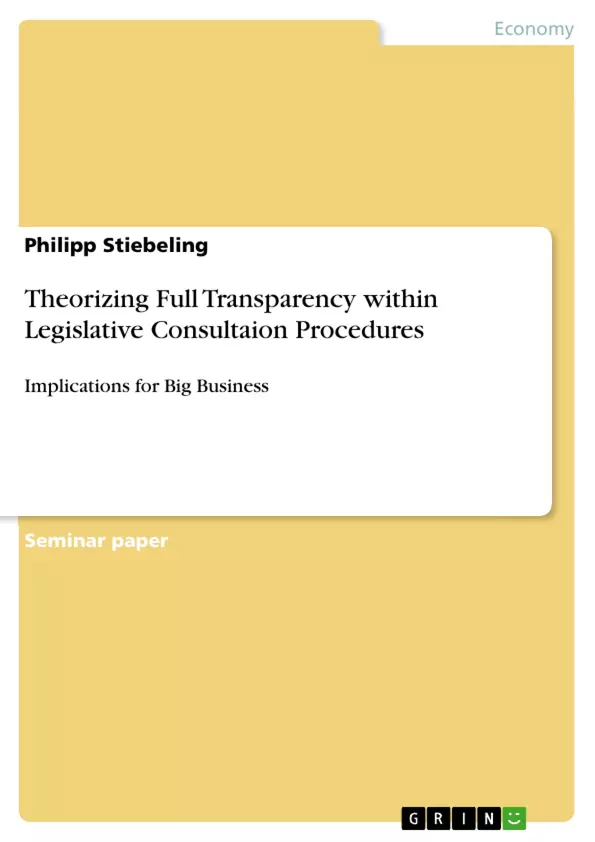With the breakthrough in information technology since the early 1990s pivoting in a maturing
global information network accessible for a broad mass of consumers called the internet, the
power information relays to its "owner" and the means and speed of its diffusion have been
revolutionized. In this context, looking at various societal actors, the issue of equal access to
and transparency of information triggered not only broad scientific research efforts, but again
placed the spotlight of public scrutiny on the issue of transparency of information in societal,
economical and governmental mechanisms of decision making and business conduct. Civil
society bombarding multinational enterprises with postulations to disclose supply chain
locations and their labor and environmental practices especially abroad conveys that not doing
so bears certain, if not even very lucrative, advantages for such businesses. With
governmental legislation setting the stage for businesses` profitability in many realms,
exerting "selfish" influence on national politics holds great allurement for business itself.
Fronting supranational joint efforts like the establishment of the OECD Financial Action Task
Force1 of the G-7 member states or the European Transparency Initiative2, business has ever
since the beginning of nation states found its way to interact with the mechanism ultimately
affecting their profitability in a regulatory or constraining way. Looking back at the financial
crisis of 2008, it becomes clear that nowadays business making use of their involvement in
shaping national policies has not declined at all. The multinational "Cash for Clunkers" law
and the failure of the "nutrition facts traffic light" law in Germany prove conclusive examples
of how "a passive transmission belt for corporate interest" (Stubbs 2006: 171) in form of
lobbyism successfully influences legislative outcomes which crucially benefit a certain
societal group. With a broad landscape of "industries of intermediaries" (Bac 2001: 95) which
offer not only the expertise but also the necessary connections to crucial hotspots of
legislative decision making, "Big Business" is successfully leveraging its` resources to
increase its power. Consequently civil society`s scrutiny in terms of where and to what extent
certain business actors are involved in legislative outcomes is vital to ensuring the common
good being put ahead of interests of certain societal elites.
Inhaltsverzeichnis (Table of Contents)
- Introduction:
- Research question and methodology
- The offspring of lobbyism
- The global transparency issue
- Criticism and advocacy of "full transparency"
- The legislative status quo of "transparency legislation".
- Lobbyism within a "world of full transparency".
- Implications for "big business"
- Conclusion and future outlook ......
Zielsetzung und Themenschwerpunkte (Objectives and Key Themes)
This paper analyzes the impact of full transparency within legislative consultation procedures on the behavioral change of "Big Business" involved in lobbying activities. It aims to understand the implications of mandatory disclosure of affiliations and funding sources for lobbyists on their practices and resource allocation.
- The historical evolution of lobbying and its impact on legislative outcomes.
- The concept of transparency and its relevance to democratic governance.
- The implications of "full transparency" for lobbying practices and resource allocation by "Big Business".
- The challenges and opportunities associated with implementing "full transparency" in legislative consultation processes.
- The potential impact of "full transparency" on the relationship between civil society, businesses, and government.
Zusammenfassung der Kapitel (Chapter Summaries)
- Introduction: This chapter introduces the research question and contextualizes the discussion by highlighting the significance of information transparency in a globalized world. It emphasizes the influence of lobbying activities on legislative outcomes and the growing concern over the lack of transparency in this process.
- Research question and methodology: This chapter outlines the research question and methodology employed in the paper. It identifies the focus on mandatory registration requirements for lobbyists and the importance of transparency within the consultation phase of parliamentary lawmaking.
- The offspring of lobbyism: This chapter traces the historical roots of lobbying, highlighting its evolution from early forms of interest representation to the modern, sophisticated lobbying industry. It explores the constitutional and historical context for lobbying activities and its growing influence on national and international political processes.
- The global transparency issue: This chapter delves into the concept of transparency, examining its various definitions and its relevance to democratic governance. It explores the arguments for and against "full transparency" in legislative consultation procedures, outlining the challenges and opportunities associated with implementing this principle.
Schlüsselwörter (Keywords)
The core concepts of this paper revolve around the influence of "Big Business" on legislative processes, transparency, and the impact of "full transparency" on lobbying practices. Key terms include lobbying, transparency legislation, legislative consultation, interest representation, civil society, and behavioral change.
Frequently Asked Questions
What is the impact of full transparency on lobbying by Big Business?
The paper analyzes how mandatory disclosure of funding and affiliations might change the behavior and resource allocation of large corporations in political consultation.
Why is transparency important in democratic governance?
Transparency ensures that the common good is prioritized over the interests of elite groups by allowing civil society to scrutinize legislative processes.
What are the main arguments against 'full transparency'?
The paper explores criticisms and advocacy, including potential challenges like administrative burdens and the complexity of disclosure.
What are some examples of successful lobbying outcomes mentioned?
The paper cites the 'Cash for Clunkers' law and the failure of the 'nutrition facts traffic light' law in Germany as examples of corporate influence.
How has information technology changed the transparency issue?
The internet has revolutionized the speed of information diffusion, making it easier for civil society to demand disclosure but also for intermediaries to influence policy.
- Quote paper
- BA Philipp Stiebeling (Author), 2010, Theorizing Full Transparency within Legislative Consultaion Procedures, Munich, GRIN Verlag, https://www.grin.com/document/153423



